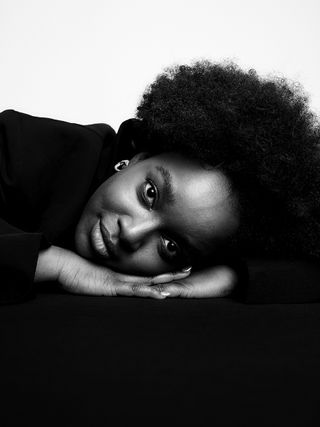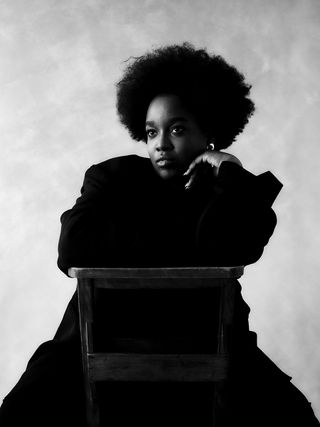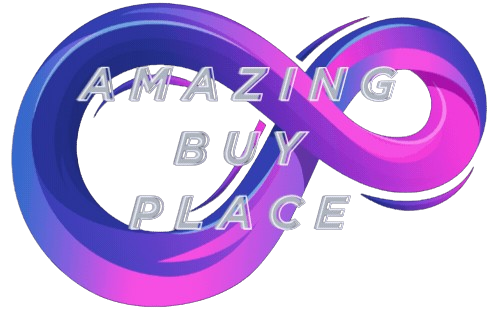(Image credit: Oliver Mayhall)
Of all the reasons to watch the new HBO series The Franchise (there are many—trust us), the number one should be Lolly Adefope because she is delightfully funny, and we love her. You probably know her as Fran, the ultimate BFF and hype woman in Shrill, or as the endearing Georgian noblewoman Katherine “Kitty” Higham from the BBC comedy Ghosts or the overworked angel Rosie in Miracle Workers. What I’m trying to say is Adefope is responsible for bringing some of our favorite humorous gals to the screen as of late, and her latest character is no exception.
Okay, now for some of the other reasons to watch The Franchise. The original script comes from the brilliant minds of Armando Iannucci, Sam Mendes (yes, the Oscar-winning director), and Jon Brown. It’s a completely original and whip-smart satire about the chaotic behind-the-scenes struggles of making a superhero movie, which feels particularly apropos at a time when Marvel and DC are, well, struggling. Most of its outrageous storylines are plucked from actual anecdotes of people who have worked on these sets, and it has a truly delightful comedic ensemble cast, including Himesh Patel, Aya Cash, and Billy Magnussen.
Adefope arguably steals the show as Dag—a third assistant director who, despite her low-on-the-totem-pole position, always has something to say. Dag is lovingly annoying and has zero filter, and thanks to Adefope’s fantastic timing, this leads to some of the series’ best LOL moments. Have we sold you on it yet? If you need more convincing, keep reading for our refreshingly honest chat with the star herself.

(Image credit: Oliver Mayhall)
The concept of The Franchise is so wonderfully smart and timely. What excited you about being a part of this project?
The name Armando Iannucci is so exciting. I grew up watching [his shows] The Day Today and Brass Eye, and The Armando Iannucci Shows is one of my favorite comedy shows and one of my biggest influences. So seeing his name on an email is enough to be like, “Absolutely, I don’t need to hear anymore.” And like you said, you are filming something that feels very alive and very current. It’s also something I’ve never seen before, and I’m always excited to be a part of something that feels new. I just love comedy and ensemble comedy, and it was so much fun.
There is also something really funny about the fact that this is an HBO show, which is owned by Warner Bros., which owns the DC universe.
Yeah. It’s like when Black Mirror did the episode about Netflix stealing all of your data. I feel like those are the best people to tell those stories sometimes.
You have these absurd filming situations happening in the show that the creators have said are inspired by real-life anecdotes from people who have worked on these kinds of films. Were there any scenes that really surprised you?
There’s something that happens—I think it’s in episode six or seven—that I would imagine anybody watching it would think, “Oh, well that’s definitely not one of the stories that happened to someone in real life,” and it is. I don’t want to ruin it. It’s almost nothing to do with superheroes. It’s just an insane thing that happened on a set involving some animals that was a true story. I think they had started writing the episode, and then they were talking to the producer, and the producer ambiently said, “Oh, this funny thing happened to me once while I was filming,” and [the writers] were like, “Well, we have to put that in.” Aside from the insanity of Marvel and all of these superhero movies, so much strange stuff happens on TV and film sets anyway, but I’m trying to think of ones that are earlier on [in the show].
There is one moment… There’s a cameo coming in, and the runner has to get some specific mouthwash couriered in from… I think it’s Cardiff, and it costs like £800. That is probably the most normal thing happening on these superhero sets—just the insane perks that the stars get and the insane way they treat them. Of course, these films are going to be chaos if that’s what’s going on behind the scenes.
Did that make you more aware of your own actions on set as an actor?
I think I probably knew already, but it definitely made me think, “Wow, the actors are kind of the least hardworking people on a set.” Obviously, everyone is working hard, and everyone is doing their best, but the difference is that the actor gets loads of glory, and people congratulate them all the time and tell them where to go, and they get treated very well. The ADs [assistant directors] do not get that at all. We all spoke to our corresponding real-life person, and the third AD I spoke to was like, “Almost every other crew member can complain or rant about something if it’s going wrong, but the third AD just has to absorb every other crew member’s rage and be like, ‘Yeah, I’m really sorry this has happened. We’re working on it.'” I don’t think I was aware of that specifically before.
I always thought it was the producer dealing with the brunt of those complaints, but it’s actually the ADs. They have to deal with so many different personalities and agendas.
Yeah and also hide certain things from certain people and balance everything. I love how in the pilot Aya [Cash]’s [character Anita’s] clothes are just so expensive, and you can just tell that the producer is actually earning loads of money. Not that they aren’t working hard, but that might be something that people didn’t necessarily know before. I thought that was a fun little tidbit.
Your character Dag is a third AD who seems a bit out of her depth when we first meet her. Why is someone like Dag a treat for you to play?
At the beginning, she is really thrown in at the deep end. In the first episode, you are establishing who everyone is and their relationships within the world they’re in and the dynamics with each other. It was really fun because very quickly she settles in and starts to say exactly what she thinks. It’s kind of like she’s not the voice of reason but the outside voice or the audience voice who is saying, “Isn’t this kind of crazy?” Everyone else has to go along with it and be like, “Yes, it is crazy, but that’s how it works,” and she is the one dissenter who is like, “But it’s really crazy.” It’s quite fun to be just annoying and like the smart aleck. It’s fun to bounce off of the other characters and be more of a loose cannon. That’s always a fun role, someone who has no filter and is along for the ride. … The third AD has no power really.
It’s quite fun with Dag because she is so open about how she just wants to become an exec and just get to the top, which I don’t think anyone would say in real life. But it’s quite fun to acknowledge the hierarchies and how far down the third AD is and then be like, “Hey, this is actually not fun, and I want to be up there.”
Is it safe to say Dag isn’t your typical third AD?
I don’t think so. All of the third ADs that I met on The Franchise were all so nice and wonderful. In the fantasy world of television, maybe it will work out for Dag. Being this mouthy person will get her to the top, but I think the hierarchies are so ingrained in real life, and I don’t think anyone is brave enough really or silly enough to try and rock the boat in order to try and get to the top. She kind of reminds me of a third AD who actually just wants to be an actor. She has the confidence of an actor and acts like an actor on set, even though her role is third AD.

(Image credit: Oliver Mayhall)
Oscar winner Sam Mendes directed the pilot episode. He’s known for his more serious cinematic films, so how was it working with him on a comedy project?
It was very cool. I was obviously very intimidated, but he is very nice and so good at what he does. I don’t think this is a negative thing, but he’s a perfectionist in a way that I find really inspiring. Even though it’s a comedy, the subject matter is something that is quite cinematic and quite big, so it’s the perfect combination to have someone with that cinematic eye alongside Armando and Jon [Brown], who have more of a comic background. Especially because you see the film within the show, you need both the comedy and the grandness of cinema. I think it’s a winning combination having someone as experienced as that leading the pilot.
The creators have said that, when casting for this show, they didn’t want anyone who had previously starred in a comic book franchise. Real talk: Now that you have done this show and know some of the chaos that can happen on these sets, do you have any interest in doing a superhero franchise film?
Now that I’ve worked on The Franchise, I want nothing more than to be in every single Marvel movie. [Laughs] In a way, now that I know what it’s really like, it almost feels like you’re better placed to do something like that. I can’t really even imagine it. Never say never, but it does sound insane. But if you’re listening… maybe.
You have played so many great comedic characters over the years. What were some of your biggest influences coming up, and when did you know you wanted to do this as a career?
My interest probably began when I was younger and watching The Amanda Show and Disney Channel and Nickelodeon. Watching other children do sketch comedy is probably where I was first awakened and then as a teenager watching Day Today and The Catherine Tate Show and Peep Show, lots of British comedy. I never really knew how to connect loving comedy and wanting to do it as a career with what that career actually was and how you get there. I did the Edinburgh Festival Fringe when I was in my early 20s, and that’s when I saw it more as people in front of me doing it as a job rather than a television screen, which feels so far away. I started doing open mics in London when I was in my mid-20s and then went to the Fringe and took a five-minute spot and then a 15-minute spot and then a half-hour spot and went up to doing a show. It was a slow burn of me realizing, “Okay, there are comic actors, and they do sketch comedy live and audition and do this.”
Could you ever see yourself doing a comedy special?
No, I love being an actor because I always did characters. I don’t know if I’ve seen many examples of character specials. It feels like something that is more akin to theater. If I saw more examples of it, I would want to do it.
What are you really looking for in a project these days, comedy or otherwise?
I guess it’s a few things: an interest and a respect for the people involved and hopefully to be a fan of their previous work. I would want to say something that challenges me, but I think deep down it’s more like, “Oh, I think I can really nail that, and I think I’m the right person to do that.” … If I’m going to be getting up at 5 o’clock in the morning every day, am I going to be waking up thinking, “I can’t wait to go and do that thing” rather than “I can’t wait to tell people I was in that thing”? That’s a bonus as well, but I think the day-to-day enjoyment of it is the most important thing and feeling fulfilled. … You are creating something that you are proud of and that you’ll keep memories of being this rewarding experience.
What have been some of those projects for you?
Ghosts, which I loved. Shrill, which I loved. I did one episode of a show that just came out called We Might Regret This. I was just in one bit of it, but I was like, “This show is so good.” That’s one of the other things, especially if you’re not a lead in something—feeling like, “Even if I’m just contributing something small to this, I’m proud to be a part of that thing.” I loved doing Miracle Workers as well. I made lots of great friends.
What would be your next dream project?
I would love to do a really funny rom-com.
I think you need to do The White Lotus.
Yeah, exactly. I’m telling myself because I’m in The Franchise I can’t be in The White Lotus. That’s why they didn’t want me for The White Lotus. … If I say anything specific, it feels like I’m jinxing it. Basically just cool, interesting comedy with people who I love and respect.
The Franchise is now streaming on Max with new episodes airing Sundays at 10 p.m. ET.







